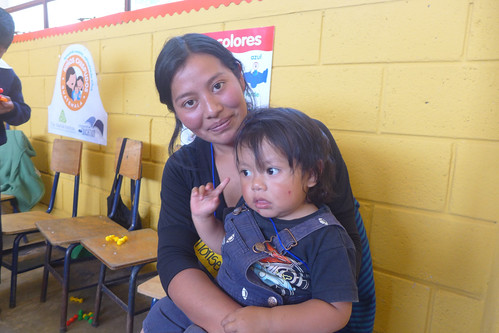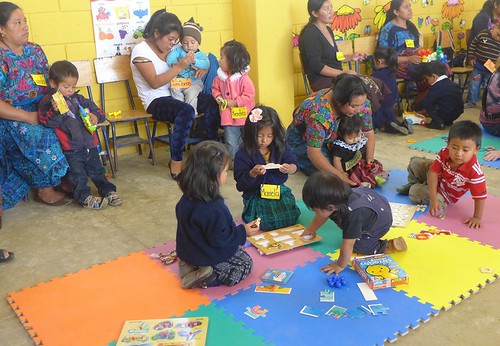
Every mother wants to give her child the best possible care, from 15-year-old Kimberly and her first baby to Maura, who is now around 40 and caring for her first grandchild. But in rural Guatemala, where poverty rates often exceed 70% and average educational attainment is less than three years, they just don’t have all of the information that they need. Kimberly is one of the many teenage girls in rural Guatemala who drop out of school to start a family; more than half are married by age 18. The educational situation is even more dire for Maura. In her generation, women were lucky if they got to go to school for just a year or two. This lack of education affects more than just the women themselves—it also leaves them ill-prepared to give their young children the nutrition and cognitive stimulation they need to succeed in life. USAID reports that in many of the indigenous communities in Guatemala’s highlands, almost 70% of children under five suffer from chronic malnutrition, one metric which underscores their mothers’ lack of education .
But there’s excitement in the air as Kimberly, Maura, and 12 other mothers file into a classroom at Chixolis Primary School in Santiago Sacatepéquez, leading toddlers by the hand or carrying their babies in slings. There’s hope that their children will be different—that their daughters and sons will be Niños Chispudos—“Little Smarties”.
Niños Chispudos is the local name for a new collaborative project between CoEd, Idea Global, and The Mathile Institute. This early childhood development (ECD) program provides Guatemalan mothers with training in early stimulation, socio-emotional well-being, and nutrition (through Chispuditos®— a nutritionally fortified powdered drink mix developed by The Mathile Institute) for their children ages 0-5. The training takes place each week during workshops at Chixolis and at another local primary school, El Calvario. Both schools have successfully completed teacher training through our Culture of Reading Program, which means that these “Little Smarties” will enter primary school with the nutritional and cognitive foundations that are crucial to their ability to learn all that their CORP-trained teachers can offer.
Although our programs have always benefited school-aged children, research increasingly shows that what happens during the first 1,000 days of life can impact a child’s ability to learn and think throughout their entire lives. By partnering with organizations that specialize in cognitive development and nutrition during these stages, we can take advantage of the latest development thinking without deviating from our mission and core services. It’s a smart investment—some sources report that addressing malnutrition alone brings $59 of benefit for every dollar spent. The ECD collaboration also aligns with our strategic plan’s call to build partnerships that serve our beneficiaries in innovative ways.
 We may be counting on our partners to carry out ECD on the ground, but we’re still making sure to incorporate two key elements of all our programs. The first is a concrete measurement plan. We’re working with our partners to ensure that ECD has clear and measurable goals, and the results of the first studies will be out this December. Another hallmark of CoEd programs is community ownership. The ECD workshops are currently led by a psychologist and a facilitator, but our partners at Idea Global are working to identify a few of the most involved mothers to act as leaders of the group. In the coming years, those mothers will be trained and empowered to lead the group on their own, with support and oversight from the facilitator that tapers off in years three and four.
We may be counting on our partners to carry out ECD on the ground, but we’re still making sure to incorporate two key elements of all our programs. The first is a concrete measurement plan. We’re working with our partners to ensure that ECD has clear and measurable goals, and the results of the first studies will be out this December. Another hallmark of CoEd programs is community ownership. The ECD workshops are currently led by a psychologist and a facilitator, but our partners at Idea Global are working to identify a few of the most involved mothers to act as leaders of the group. In the coming years, those mothers will be trained and empowered to lead the group on their own, with support and oversight from the facilitator that tapers off in years three and four. 
We’re so excited to announce the launch of this new collaborative project. We can’t wait to watch Kimberly’s daughter, Maura’s granddaughter, and the rest of these children as they enter our CORP schools, go on to study with CoEd textbooks in middle school, and perhaps even participate in our Scholarship and Youth Development Program. With educational interventions now beginning in those crucial first 1,000 days of life, these children’s futures will be as bright as the sunny yellow walls of the ECD training room at Chixolis.


Trackbacks/Pingbacks